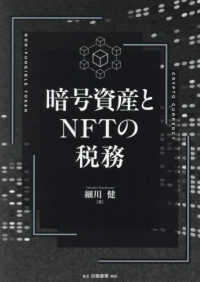- ホーム
- > 洋書
- > 英文書
- > Science / Mathematics
Full Description
A General History of Horology describes instruments used for the finding and measurement of time from Antiquity to the 21st century. In geographical scope it ranges from East Asia to the Americas. The instruments described are set in their technical and social contexts, and there is also discussion of the literature, the historiography and the collecting of the subject. The book features the use of case studies to represent larger topics that cannot be completely covered in a single book.
The international body of authors have endeavoured to offer a fully world-wide survey accessible to students, historians, collectors, and the general reader, based on a firm understanding of the technical basis of the subject. At the same time as the work offers a synthesis of current knowledge of the subject, it also incorporates the results of some fundamental, new and original research.
Contents
Introduction
Horology: The word
Hour Systems
1: Jérôme Bonnin: Time measurement in Antiquity
2: India and the Far East: dials, water-clocks, fire-clocks
S. R. Sarma: India
David Chang: China to 1900
Ron Good, Jon Ward: Modern China
Katsuhiro Sasaki: Japan
3: Late Antiquity and the Middle Ages
Anthony Turner: Sun-dials and water-clocks in Byzantium and Islam
Mario Arnaldi: Time-reckoning in the Medieval Latin world
Sebastian Whitestone: Water-clocks and the earliest escapements
Anthony Turner: Sand-clocks, sand-glasses, and fire-clocks
4: Marisa Addomine: Public clocks: fourteenth to eighteenth centuries
5: The domestic clock in Europe
Dietrich Matthes: From the fifteenth century to the mid-seventeenth century
Wim van Klaveren: From Huygens to the end of the eighteenth century.
6: David Thompson: Watches in Europe 1600 - 1800
7: Anthony Turner: The Structures of horological manufacture and trade: sixteenth to eighteenth centuries
8: Denis Savoie: The development of the sundial fourteenth to twentieth centuries
9: Clocks as astronomical models
Karsten Gaulk, Michael Korey, Samuel Gessner: Planetary clocks to the end of the eighteenth century
Denis Roegel: The nineteenth and twentieth centuries.
10: Sharon Kerman: Musical and automaton clocks and watches: sound and motion in time-telling devices
11: Jonathan Betts: The quest for precision in astronomy and navigation
12: Anthony Turner: Decimal Time
13: Industrial manufacture: clock and watch-making in the nineteenth and twentieth centuries
James Nye: The mixed fortunes of Britain
Michael Edidin: American horology and its global reach
Joëlle Mauerhan: The horological endeavour in France
Johann Boilat: The challenge of the Swiss and their competitors
Sibylle Gluch: Developing the German industry
Françoise Collanges: A case-study in standardisation: la pendule de Paris
14: Jonathan Betts: Precision attained: chronometers and regulators in the nineteenth and twentieth centuries
15: Catherine Cardinal: Responding to customer demand: the decoration of clocks and watches from the Renaissance to recent times
16: Roger Smith: Eighteenth-century clock exports from Britain to the East Indies
17: Marisa Addomine: Public clocks in the nineteenth and twentieth centuries
18: David Boettcher: Wrist-watches from their origins to the twenty-first century
19: James Nye, David Rooney: Electricity, horology, and networked time
20: Joëlle Mauerhan: Women in horology
21: Jonathan Betts: The keeping of clocks and watches: maintenance, repair and restoration
22: Estelle Fallet: Accessories in horology
23: Applications of clockwork
Jim Bennett, Anthony Turner: Orreries and planetaria
Paolo Brenni: Timers and telescope drives
Anthony Turner: Metronomes
James Nye: Car clocks
Jonathan Betts: Watchmans' clocks
Anthony Turner: Roasting jacks
24: Christina Faraday: Horology verbalised; horology visualised
25: Bernhard Huber: The Literature of horology
26: Anthony Turner: Collecting and writing the history of horology
27: Glossary
28: Bibliography
Index








